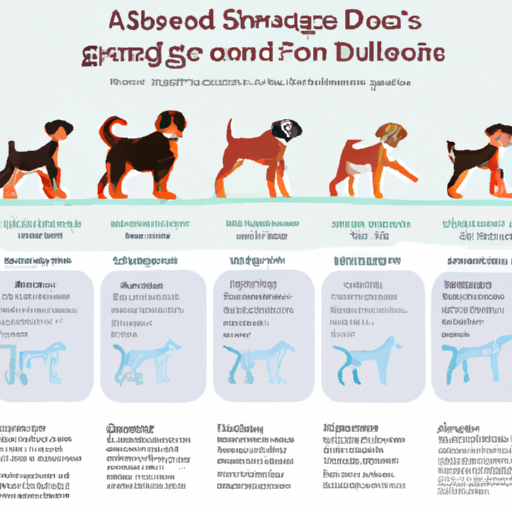Understanding Your Dog’s Developmental Stages
You might find yourself looking at your playful puppy one day and wondering, “When do dogs become adults?” Understanding your dog’s growth and development stages can help you provide the best care and training to your furry friend.
Dogs, much like humans, go through various stages of development. From the helpless newborn phase to the challenging ‘teenage’ months, your dog’s growth can be segmented into distinct periods. These periods are essential to understand because they impact your dog’s behavior and development.
- Neonatal period (0-2 weeks): At this stage, puppies are entirely dependent on their mother.
- Transitional period (2-4 weeks): During this stage, puppies start to open their eyes and become more aware of their surroundings.
- Socialization period (4-12 weeks): This is a critical period for puppies to learn about the world and develop social skills.
- Adolescence (6-18 months): During this stage, dogs may exhibit behavior changes, similar to ‘teenage’ humans.
- Adulthood (1-3 years): Most dogs are considered adults at this stage.
Recognizing The Physical Signs of Adulthood
Your dog’s physical appearance will undergo significant changes as they transition into adulthood. You’ll notice your dog has stopped growing and their appearance has stabilized. For small breeds, this usually happens around 10-12 months, while large breeds might not fully grow until they’re 18-24 months old.
Here are some physical signs that your dog has reached adulthood:
- Their teeth are fully grown and appear clean and white.
- They have a full coat of adult fur.
- Their size and weight have stabilized.
Behavioral Changes: The Transition to Adulthood
As your dog grows, you’ll notice changes in their behavior. Adolescence is often the most challenging period for dog owners, as this is when dogs become more independent and may begin testing boundaries.
Here are some behavioral traits that indicate your dog has entered adulthood:
- They are less destructive and have fewer ‘accidents’ at home.
- They listen and respond to commands more consistently.
- They show less interest in ‘play’ and more interest in ‘work’.
Health Care for Adult Dogs
When your dog reaches adulthood, their health care needs will change. Regular veterinary checkups are essential to ensure your dog is healthy and happy. Here’s a basic healthcare schedule for your adult dog:
| Age | Health Check |
|---|---|
| 1 year | Full physical examination, vaccinations as needed |
| 2 years | Full physical examination, dental cleaning as recommended |
| 3 years | Full physical examination, bloodwork as recommended |
FAQ: When Are Dogs Adults?
Q: When is a dog considered an adult?
A: Most dogs are considered adults between 1 to 3 years, depending on the breed.
Q: What are the signs my dog is an adult?
A: Physical signs include fully grown teeth and a stable size. Behaviorally, they may be less destructive and more responsive to commands.
Q: How does my dog’s health care change as they become an adult?
A: Adult dogs need regular veterinary checkups, including physical examinations, vaccinations, and dental cleanings.
Caring for an adult dog requires understanding and patience. But remember, every dog is unique, and these guidelines are just that—guidelines. Your dog’s development may not follow these exact timelines, and that’s perfectly okay. The joy of being a dog caregiver lies in the journey of growth and discovery you embark on together.



